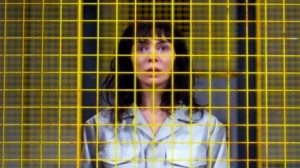The dystopian end to Utopia
Utopia was a cinematic television event. It was critically lauded from both critics and viewers alike. Its beautiful cinematography – acidic traffic light colours – were instantly recognisable. It created characters that were Shakespearean in their intricate characterisation. The storyline was original, and its central premise – how do we deal with overpopulation? – created one the most exciting, riveting and fresh dramas to be put on TV in decades. Thanks to a harrowing and frankly infamous scene, Utopia even managed to make me frightened of spoons.
And, inexplicably, channel 4 chose to cancel it.
Yes, Utopia is dead. It is the latest in a long list of cult British television series’ to hit the producers’ rubbish bin.. A lack of funding seemed to be the excuse for executing one of the most exciting shows on television, as channel 4’s ambiguously worded announcement revealed: “It’s always painful to say goodbye to shows we love, but it’s a necessary part of being able to commission new drama, a raft of which are launching on the channel throughout 2015.”
Yet when you are given such a fan-favourite gem as Utopia, the excuse of “funding” seems disappointingly hollow. I’ve read all sorts of wacky conspiracy theories for “true” reason of Utopia’s demise, ranging from the recent Ebola outbreak being too close to home, to the upcoming general election. The tangibly wonderful quality about these speculations is that these conspiracy theories could have pretty legitimately been part of the storyline of Utopia, and the outrage is a unique type to the show. I’ve seen about 40 different online petitions for its revival already, the most successful of which is poorly spelt, and there has been at least one attempt to make the government interfere on this issue. The fanbase of Utopia, small as it is, is as passionate as any of the other big hits like Sherlock or Dr Who.
On no other TV programme could such simple catchphrases: “Eat my chip”, “Quinoa – it’s a superfood” and “Where is Jessica Hyde?” manage to catch on with such aplomb. It was blessed with quality acting from some of the best actors and actresses in British television – standouts included Alexandra Roach’s portrayal of Becky, a strong female lead who was brilliantly Welsh and fabulous at swearing, three things we most definitely need more of in TV. The delicious character of Arby (Neil Maskell) was one of the most finely crafted I have ever seen on screen. Every cast member was having a whale of a time, and every single aspect of the show – from the gorgeously odd soundtrack, the mind-bendingly brilliant plotlines, to the unsettling camera angles and set design – was handled with loving care.
I hope that in future the cancellation of Utopia gets heralded as the Great Mistake of British television.
Despite my reservations, I hope that the David Fincher-directed US remake does well, if only to take a kind of vengeance on Channel 4’s huge misjudgement. If the producers had any sense, it would probably survive well in an online-only format. After all, Ripper Street was resurrected on Amazon Instant Video after a passionate petition from fans, and we can only tentatively hope for the same for Utopia.
In a world where Mrs Brown’s Boys gets its own movie and primetime viewing slot, then maybe we don’t deserve great television. Maybe we are overpopulated. Maybe we should try to create a television version of Janus, where only the populace of a certain breed of television get to survive and shows such as Tipping Point get culled, and thought-provoking, beautiful and genuinely interesting TV dramas such as Utopia are allowed to live another day.


Comments